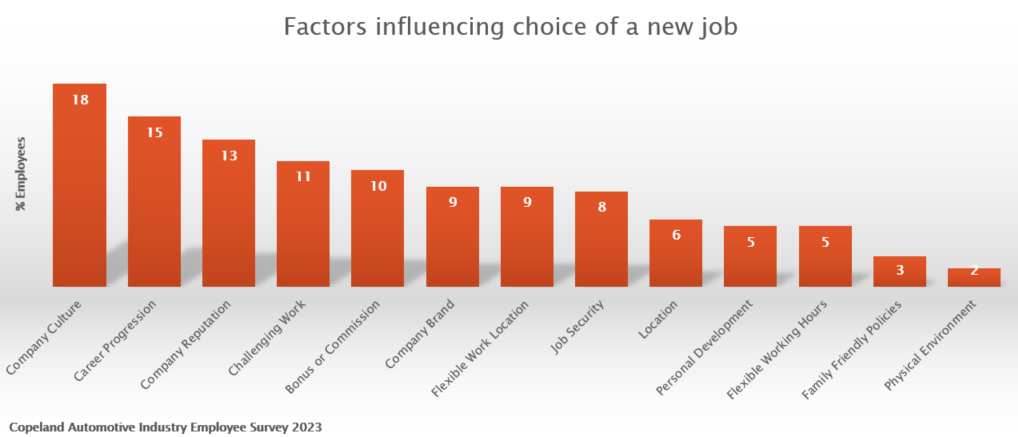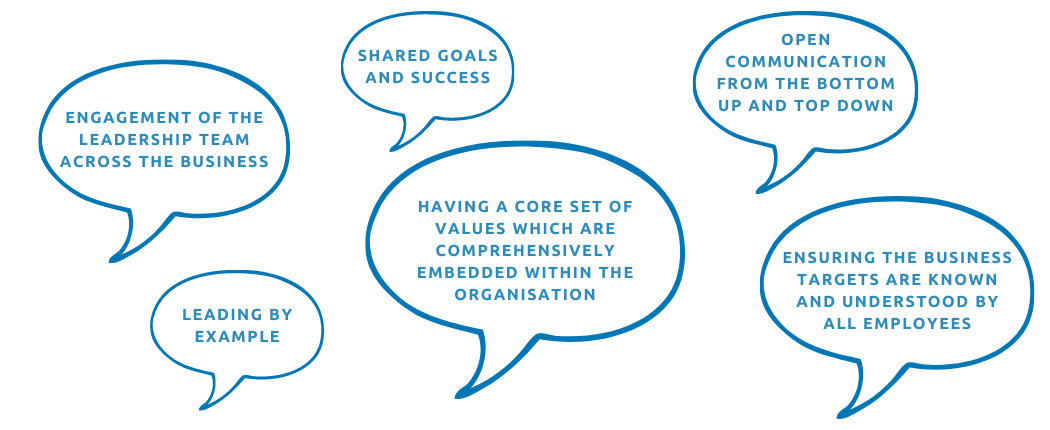Does your business have a great culture? Is it a place where employees are empowered and where there is mutual respect between employees and management? A place where goals and achievements are shared and your clearly stated core values are genuinely played out day to day?
“Culture eats strategy for breakfast” is a famous quote from management consultant and writer Peter Drucker. He was saying that no matter how good your business strategy is, it will not succeed without an empowering culture that encourages your people to make it happen.
Not only is a great culture good for business, it is also highly valued by employees. This is clearly demonstrated by Copeland’s recent independent research with automotive industry employees where we asked the question ‘Apart from Salary, what would be the most important factors that would influence your choice of new job’. As the results below show – Company Culture came out on top.

What is a company culture?
In this article we’ll look at what company culture is. We then give you some easily actionable advice on how to improve your company culture so you can reap the rewards it will offer your organisation.
The culture of an organisation is so much more than having great parties and a pool table. It’s the deeply ingrained behaviours, beliefs and values of the people with an organisation. This starts at the very top. The attitudes and actions of leaders will filter down through an organisation and influence the behaviours of everyone within it. When well executed, a culture will be a group of behaviours, beliefs and attitudes that influence how things are done.
Improving the culture of your organisation will have huge benefits to your organisation. It has been proven that a great culture really does lead to better performance and undoubtebly a higher employee retention. When employees are happy and invested in an organisation they will work harder, collaborate more and produce better results.
How to improve your culture
So what can you do to improve your company culture? A great culture dosen’t just happen overnight. It’s something organisations need to work on and requires the input of everyone across the organisation – most particularly those in leadership roles.
Copeland Automotive Recruitment recently held a poll asking UK automotive industry employees what they felt was the single most important thing that improves company culture. The resounding majority of respondents chose ‘Respect for Employees’ as the most important factor. Other responses we received included:

5 steps to improve your company culture:
1. Define your mission and values
If you don’t already have a stated mission and values, creating one is a vital step towards creating the culture you want. Ideally your senior leadership team should collectively create this – so they are all on board with it.
2. Consistently communicate your culture and values
Once you have a mission statement and values, communicate it clearly and consistently. In order to achieve your desired culture, all your employees need to have a firm understanding of what the values are. Actions you could take include:
- A detailed section in your company handbook that explains the company cultures and values
- Take time to explain and discuss your company culture during your interviewing and onboarding processes. Include interview questions to establish whether your potential new employees hold compatible values to those of your organisation
- Reguarly communicate with your employees – highlighting activities that reflect your company values. Remember that walking the walk is better than talking the talk. Communicate on individual actions or events that have occured that reflect your desired culture and applaud them.
3. Lead by example
The way your leadership team behave will effect behaviours throughout your organisation. If all your leaders have full buy-in, and act in a way that is consisent with your desired culture and values this will be a huge step towards improving your culture. Employees need to see core values consistently played-out in the behaviours of leaders. Consider creating training/programmes for your leadership team to help them fully understand your core values and teach them how to demonstrate them in their day-to-day activites.
4. Engender a culture of respect
Respect for employees was the single most important factor that employees cited for a good company culture. So clearly, creating a respectful workplace is key to improving your culture. Some actions you could take include:
- The behaviour of your leadership team is key to creating respect throughout your organisation. If managers treat all employees with equal respect then this will naturally filter through to how employees treat each other.
- Resolve conflicts constructively. If employees raise genuine concerns or a conflicts arise, you need to ensure you have a robust process to manage and resolve this.
- Genuinely support employee wellbeing. This comes in all shapes and sizes but most importantly – if your organisation claims to take employee wellbeing seriously – make sure you really do. Do you allow employees time off for un-forseen life events? What about health / mental health support? Be open to employee requests for flexible working / working-hours. Remember that happy employees will usually be more productive.
5. Empower & listen to your employees
Organisations with great cultures will have employees who feel empowered and are confident to put forward ideas and suggestions. As quoted above – having ‘Open communication from the bottom up and top down’ is key to this. Actions to take:
- Share goals and successes. If employees feels that their personal goals are part of a larger team-wide goal then will feel more engaged. Likewise share and praise successes – however small they may be.
- Listen to your employees. Encourage managers to have an ‘open door’ policy so that employees feel able and comfortable raising ideas, concerns or issues.
- Encourage and applaud new ideas and suggestions. Have a ‘no idea is a bad idea’ approach. Organisations that listen to all their employees will be more likely to flourish and leaders will have a clear understanding of all aspects of the business from the bottom up.
- Encourage employees to be accountable for their actions and take ownership of their results.
Final thoughts
This article for automotive industry employers – about building a great company culture – was written by Julia Pennington, Managing Director of Copeland Automotive Recruitment. Julia has over 20 years’ experience working with organisations in the automotive industry filling vacant sales, marketing and operations positions. Learn more about how we help businesses build great teams or get in touch to discuss your hiring needs.
…
Further Reading:
How to Build a Talent Pipeline
…

